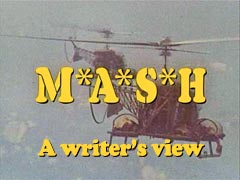M*A*S*H: A writer’s view. #10 in the series.
Let us go back a bit, to the spring of 1977. The finale of the fifth season of M*A*S*H was ‘Margaret’s Wedding’, which was also the swan song for Gene Reynolds (who directed the episode) and Larry Linville. It also marked the first on-screen appearance of Col. Donald Penobscot, whose off-screen engagement to Margaret Houlihan had already caused such far-reaching changes to the tone of the show and the balance of the cast.
On this occasion only, Penobscot was played by Beeson Carroll: clean-cut, likable, well-spoken apart from a tendency to mix up words when drunk (he finished ‘396th out of 227’ at West Point, where he went in for ‘Greco-wrestle Romaning’). It was a hilarious rather than a happy ending to the engagement. The Swampmen, in one of their most heartless practical jokes, encase the hapless Penobscot in a body cast the night before the wedding. By the time they relent and try to tell Margaret that he has not broken half the bones in his body, it is too late: the newlyweds are already departing by helicopter, and can’t hear over the noise of the chopper blades. The only blue note in the composition is played by Frank Burns, standing alone and forlorn on the helicopter pad, saying to the empty sky: ‘Goodbye, Margaret.’
And goodbye it is: for while Loretta Swit returned in the new season and remained with M*A*S*H to the end, Hot Lips was gone for good. (It is significant that her nickname is used only a handful of times in the last six seasons.) Nor was it simply a case of replacing ‘Miss Houlihan’ with ‘Mrs. Penobscot’. The new production team, dominated by Alan Alda, decreed that Margaret’s marriage should be doomed from the start.
In ‘Fade Out, Fade In’, besides writing out Frank Burns and writing in Charles Emerson Winchester III, Fritzell and Greenbaum were assigned the task of wrecking the marriage during the honeymoon. Margaret actually leaves Donald in Tokyo and returns to the 4077th before her leave is over. The Swampmen, consumed with curiosity, pester her with kindness until she confesses:
[Read more…]








Recent Comments